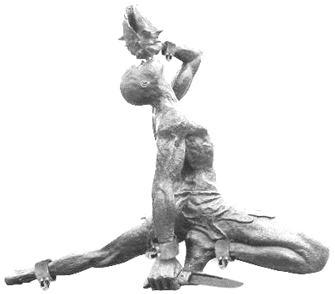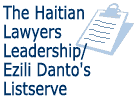|
|
|
Haitian food crisis sending refugees to the sea
By Joseph Guyler Delva, Reuters, April 23, 2008
*********
*********************
20
Haitians bodies found near Bahamas,
April 22, 2008
*********************
Dominican
Crackdown Leaves Children of Haitian Immigrants in Legal Limbo,
May 25, 2008
*********************
*********
Kanga
Mundele: Our mission to live free or die trying, Another Haitian
Independence Day under occupation
by Marguerite Laurent, Haitian Perspectives,
January 1, 2006
******************
October
17, 2007 - Ezili Dantò's Note on the current situation
in Haiti
**************
**************
Eyewitness
account of the abduction of President and First Lady Aristide
of Haiti by the United States Special Forces
**********
|
Dessalines
Is Rising!!
Ayisyen: You Are Not Alone!
*********************
Hope
and Humiliation: HLLN’s analysis of May 18, 2006 and the Inaugural
of President Rene Preval by Marguerite Laurent
*********************
*********************
Many Haitians want exiled Aristide back,
April 16, 2008
*********************
*********************
FOOD
CRISIS: 'The greatest demonstration of the
historical failure of the capitalist model' by
Ian Angus, Global
Research, April 28, 2008
****************
*********************
30
Years Ago Haiti Grew All the Rice It Needed. What Happened?
The U.S. Role in Haiti's Food Riots,
By Bill Quigley , April 21, 2008
****************
******************
Is Starvation Contagious? by John Maxwell,
Jamaican
Observer
******************
Review of Peter Hallward's "Damming the Flood" (Part I) -
by Stephen Lendman,
OpEdNews.com
******************
1804
Independence Proclamation of Haiti's Founding Father, General Jean Jacques
Dessalines "....if they find asylum amongst us,
they will be once more the schemers of our troubles and our divisions."
*********
******************
|
| |
 |
| To subscribe,
write to erzilidanto@yahoo.com |
 |
 |
 |
 |
| |
 |
 Carnegie
Hall Carnegie
Hall
Video Clip |
| |
No
other national
group in the world
sends more money
than Haitians living
in the Diaspora |
 |
|
The
Red Sea |
 |
| 
Ezili Dantò's master Haitian dance class (Video clip)
 Ezili's
Dantò's Ezili's
Dantò's
Haitian & West African Dance Troop
Clip
one -
Clip two
|
 |

So
Much Like Here- Jazzoetry CD audio clip
|
 |
|
Ezili Danto's
Witnessing
to Self

Update
on
Site Soley |
|
 |
| RBM
Video Reel

|
| |
| |
| |
| |
|
 |
 |
 |
| |
Haitian
immigrants
Angry with
Boat sinking
 |
 |
| A
group of Haitian migrants arrive in a bus after being
repatriated from the nearby Turks and Caicos Islands,
in Cap-Haitien, northern Haiti, Thursday, May 10, 2007.
They were part of the survivors of a sailing vessel crowded
with Haitian migrants that overturned Friday, May 4 in
moonlit waters a half-mile from shore in shark-infested
waters. Haitian migrants claim a Turks and Caicos naval
vessel rammed their crowded sailboat twice before it capsized.
(AP Photo/Ariana Cubillos)
|
|
| |
| |
| |
| |
 |
 |
|
 |
| |
 |
Dessalines'
Law
and Ideals
|
 |
Breaking
Sea Chains |
 |
 Little
Girl Little
Girl
in the Yellow
Sunday Dress

|
 |
| Anba
Dlo, Nan Ginen |
 |
| |
 |
 |
Ezili
Danto's Art-With-The-Ancestors
Workshops - See, Red,
Black & Moonlight series or Haitian-West African
Clip
one -Clip
twoance performance |
 |
 |
In
a series
of articles written for the October 17, 2006 bicentennial
commemoration of the life and works of Dessalines, I wrote
for HLLN that: "Haiti's liberator and founding father,
General Jean
Jacques Dessalines, said, "I Want
the Assets of the Country to be Equitably Divided"
and for that he was assassinated by the Mullato sons of France.
That
was the first coup d'etat, the Haitian holocaust - organized
exclusion
of the masses, misery, poverty and the impunity of the economic
elite
- continues (with Feb. 29, 2004 marking the 33rd coup d'etat).
Haiti's peoples continue to
resist the return of despots,
tyrants and enslavers who wage war on the poor
majority and Black, contain-them-in poverty through neocolonialism'
debts, "free trade" and foreign "investments."
These neocolonial tyrants refuse to allow an equitable division
of wealth, excluding the majority in Haiti from sharing in
the
country's wealth and assets."
(See
also, Kanga
Mundele: Our mission to live free or die trying, Another Haitian
Independence Day under occupation; The
Legacy of Impunity of One Sector-Who killed Dessalines?;
The Legacy of Impunity:The
Neoconlonialist inciting political instability is the problem.
Haiti is underdeveloped in crime, corruption, violence, compared
to other nations,
all, by Marguerite 'Ezili Dantò' Laurent |
| |
|
|
|
 |
| No
other national group in the world sends more money than Haitians
living in the Diaspora |
 |
| |
| |
 |
| |
| |
|
|
Haitian
food crisis sending refugees to the sea
Reuters
(Refiles to correct date
in dateline)
By Joseph Guyler Delva
MONTROUIS, Haiti, April 23 (Reuters) - Acute hunger and the rising cost
of living could send a new wave of boat people from Haiti, where rising
food prices set off deadly riots two weeks ago and drove the prime minister
from office, officials and analysts say.
In the small town of Montrouis, about 50 miles (80 km) north of Port-au-Prince,
desperate Haitians say they will seize the first opportunity to take
a boat toward the U.S. coast to escape the misery that plagues Haiti,
the Western Hemisphere's poorest country.
"I will leave with the next boat going to Miami because I can no
longer resist this hunger," Marcel Jonassaint, 34, told Reuters
on Tuesday as he sat barefoot near the dock in Montrouis, throwing a
handful of small rocks into the ocean.
"I have four children and I don't have a job and everything is
expensive, even for those who are working," Jonassaint said. "So
what do you want me to do?"
Montrouis is a coastal village, overlooking the island of La Gonave,
reputed as a key launching point for migrant boats.
"I left earlier this year. Our boat was intercepted in the high
seas, but I will try again," said 29-year-old Rachel Chavanne.
"I know some people, like a cousin of mine, who had a successful
trip there.
"My turn will also come one day," she said in her blue dress,
with a smile on her face.
Haitian lawmakers fired Prime Minister Jacques Eduard Alexis earlier
this month to quell anger over rising food prices that sparked violent
protests in Haiti. At least six people died in a week of protests and
looting.
RUSTIC VESSELS
The director for the country's national migration office, Jeanne Bernard
Pierre, said since the food crisis, her agency has received more repatriated
Haitian boat people in a week than it used to receive in a month or
more.
"We have received 212 repatriated last week, we have just received
227 and we are receiving 114 tomorrow," Pierre told Reuters on
Tuesday.
"It is clear that more boat people have been leaving the country
and you should expect even more if they cannot find an alternative,"
said Pierre, who urged the government and the international community
to set up programs to ease the plight of the poorest and most vulnerable.
The U.S. Coast Guard has intercepted 972 Haitian migrants at sea since
Oct. 1, compared with 376 during the same period last year. But the
numbers typically fluctuate and it's impossible to link any spike in
the numbers to any one event such as the recent food riots, Coast Guard
Petty Officer Barry Bena said.
"It peaks at certain points and there's months on end when we get
no Haitian vessels at all," he said.
Pierre said her office is doing its best to persuade suffering Haitians
to stay home, but "they believe the only alternative left for them
is to leave."
Migration office employees have been sent to poor, seaside neighborhoods
to warn people how risky it is to take to the sea in rustic vessels,
but they reply by giving examples of friends and relatives they knew
made it to Miami.
"We even show them pictures of sharks eating people, but they would
tell us they know many others who reached U.S soil and who are now sending
money to relatives left in Haiti," said Pierre.
There are frequent reports of drownings when unsafe and overloaded migrant
vessels capsize or break apart while trying to reach the United States
and the Bahamas. A suspected migrant smuggling boat capsized off the
Bahamas during the weekend and rescue crews recovered three survivors
and 15 bodies, many of them Haitians.
Human rights activist Renan Hedouville said Haitians are leaving because
the government and the rest of the world have turned a blind eye to
the hungry.
"The universal right to have access to food has been neglected
and denied to so many people," Hedouville said. "That's why
people in desperate straits are taking to the sea, risking their lives
and seeking a solution which is not really one."
(Editing by Jane Sutton and Sandra Maler)
(For more stories on global food price rises, please see here)
***********************
*********************
|











